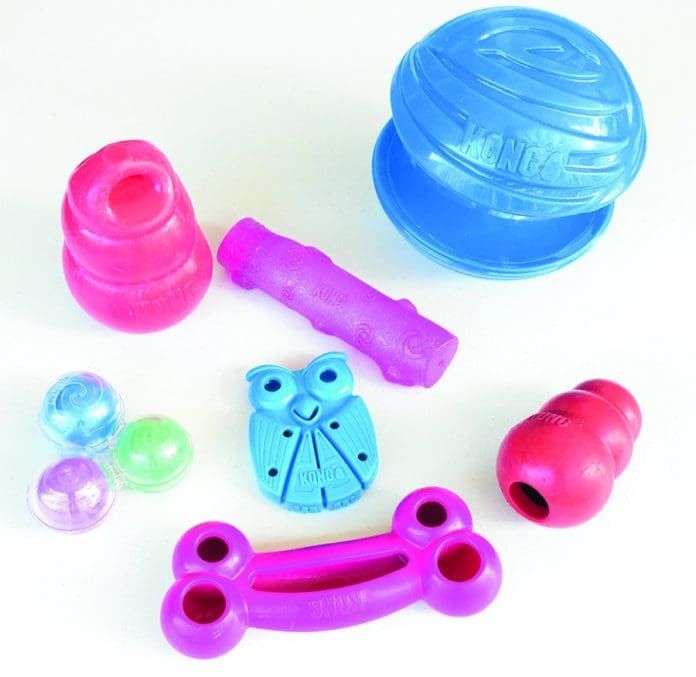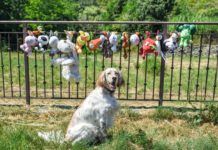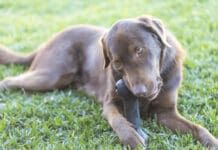The secret to happy chewing is variety. Be creative… think rubber, plastic, rope, wood, body parts (pizzles, pig ears, cow ears, chicken feet, chicken necks), fuzzy things, leather things, carrots, oranges, and more. There are advantages and disadvantages to each – they can all break, splinter, shred, be ingested – so it pays to have a chat with your vet about what to watch for when you choose your chews.
Here are some tips on selecting the best chew toys for your own dog. For a chew toy to be effective it must meet three criteria:
1. It must be attractive to the dog. The dog must want to chew it, or it is useless.
2. It must be durable. If it only lasts 30 seconds it won’t help with a long-term chewing problem.
3. It must be safe. It must not contain toxins, or easily break up (or break down) into pieces that can cause the dog to choke or suffer internal blockage or damage.
It’s important to look at individual dogs when deciding which chew objects are safe. Aggressive chewers can splinter objects and swallow large pieces that can choke a dog, cause life-threatening bowel obstructions, or tear the lining of the intestines. Delicate chewers can safely be given items that would be deadly for some dogs. A veterinarian friend gives her greyhounds rawhide chips, which might not be safe for more aggressive chewers. Aggressive chewers and dogs who must be left alone with a chew object are safest with a hard rubber, hollow Kong-type toy that can be filled with something tasty to hold the dog’s interest. Very large carrots can also make ideal chew objects for many dogs.
Over time, any chew toy softer than your dog’s teeth will become worn down. Any chew object harder than your dog’s teeth will cause wear to the teeth. It’s generally preferable to have wear to the toys than wear to the teeth.
Safety requires good judgment. Many chew objects may eventually become too small to be safe and should be disposed of before they reach a dangerous size.
I was delighted to discover that in recent years, the Kong Company has exponentially expanded its line of toys. For more than two decades, they have supplied us with the basic Kong toy – that snowman-shaped, hollow, stuffable rubber toy of varying sizes and toughness (the black ones are the toughest) – high on the list of any dog owner or trainer worth her salt. I still have the very first Kong I bought, a black one from the mid-1980s. Kong and many other companies now offer a mind-boggling array of chew toys; you have to do some research to determine which are most likely to appeal to your dog.
Shop carefully at your local pet supply store; generally, the products sold in grocery stores and discount stores are of extremely low quality and won’t last very long. They may also be made with materials of questionable safety. If you have a particularly strong chewer, ask the store staff for recommendations.
Here are some of our favorite sources of good chew toys:
Kong Company
Reputable toy manufacturer, does not sell toys direct to consumers. (303) 216-2626; kongcompany.com
SitStay
Online retailer that carries many products that might be difficult to find elsewhere. (402) 467-3426; sitstay.com
Clean Run
Specializes in gear for competitive dog sports; has unique toys and chews. (800) 311-6503; cleanrun.com
DogTuff
“Your source for the world’s most durable dog toys and accessories from top manufacturers, all at unbeatable prices.” (877) 341-0633; dogtuff.com
Tuffy Toys
Tuffy Toys are made by VIP Pet Products and sold in pet supply stores and many online retailers. They are rated by the manufacturer on a “Tuff” scale of 1 to 10, with 10 being for the most aggressive chewers. They feature a minimum of seven layers of material and extra stitching and cross-stitching. One online retailer that carries a wide variety of these toys is tuffietoys.com; (866) 478-0848.






